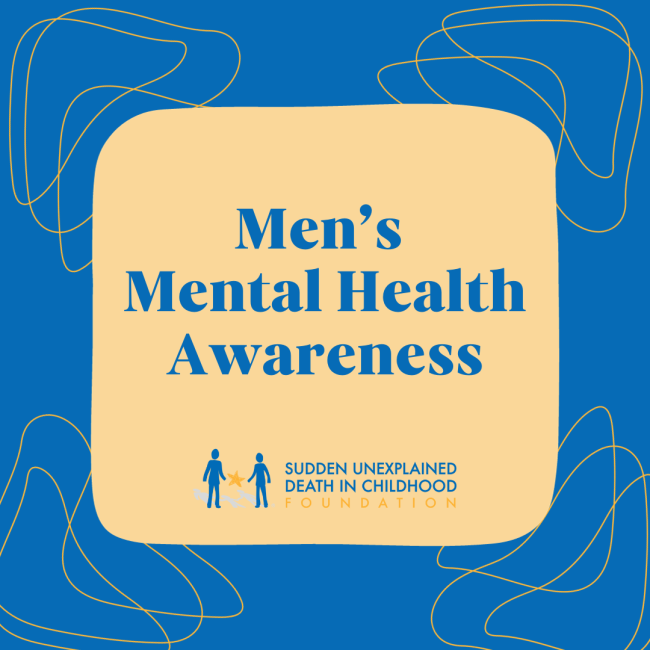01 Nov Men’s Mental Health Awareness Month: A Compassionate Approach to Supporting Fathers in Grief

Written by Amanda Brindle, LSW – Associate Manager of Family Services
In recognition of Men’s Mental Health Awareness Month, it’s important to address the distinct challenges fathers face in dealing with grief, particularly in the context of Sudden Unexplained Death in Childhood (SUDC). At the SUDC Foundation, our mission is to provide families with individualized professional, clinical, and empathetic support.
Trauma and grief do not discriminate by gender. Both men and women experience the profound pain and loss that comes with the sudden death of a child. However, societal expectations and stereotypes can create additional hurdles for men when it comes to seeking help and expressing their emotions.
Men are often conditioned to be stoic, to “be strong” and to not show vulnerability. This societal pressure can make it incredibly challenging for men to open up about their feelings when they are grieving. In the face of such profound loss, they may feel isolated, unable to share their pain, or believe that seeking help is a sign of weakness.
Breaking the stigma surrounding men’s mental health requires collective effort. It begins with understanding that seeking help and expressing emotions is not a sign of weakness but rather an act of courage and strength, leading to healing.
Supporting Fathers in Grief:
- Normalize Expression: Encourage fathers to express their emotions without judgment, as it’s a natural part of the healing process. For example, when a father talks openly about his feelings, it can create a safe space for others to do the same.
- Active Listening: Provide a non-judgmental space for fathers to share their thoughts and feelings through one-on-one conversations, support groups, or therapy. An example of active listening might be offering empathetic responses like, “I’m here for you, and I’m listening.”
- Respect Their Coping Style: Understand and respect that everyone copes differently and provide space for fathers to navigate grief in their own way. For instance, some fathers may find solace in solitary activities, while others may seek connection through group support.
- Professional Help: Suggest seeking therapy or counseling, emphasizing that it’s a proactive step towards healing. A specific example is recommending a grief counselor who specializes in helping fathers navigate their unique challenges.
- Support Networks: Connect fathers with programs like our “Dads Virtual Support Hour” and other resources designed to address the specific challenges they may face. For instance, sharing success stories of fathers who found solace in support groups can inspire others to join.
- Self-Care: Stress the importance of physical and emotional self-care. Encourage fathers to take time for activities that bring them comfort, whether it’s engaging in hobbies, exercising, or seeking solace in nature.
- Time and Patience: Remind fathers that healing is a gradual process, and there’s no set timeline for grief. Share anecdotes of fathers who found ways to move forward while acknowledging their grief, demonstrating that recovery can be a personal journey.
At the SUDC Foundation, we offer Zoom Support Groups, including our “Virtual Dads Gathering,” acknowledging the specific challenges fathers face in grief. In addition to groups support, we encourage individual outreach through staff and peer connections through our Peer Connections Program to tailor to everyone’s unique needs.
In this Men’s Mental Health Awareness Month, and every month that follows, The SUDC Foundation stands with fathers in their grief and commend their courage and resilience.
By taking these compassionate steps to support fathers in their grief, we not only break down stereotypes but also provide them with the necessary tools to heal and move forward.
Together, we can ensure that fathers, like all grievers, have the resources and support they need to heal, find hope, and rebuild their lives in the wake of unimaginable loss. To learn more about the SUDC Foundation supports for Dads, please contact [email protected].



